- Home
- Bianca Blythe
Lords, Snow and Mistletoe Page 2
Lords, Snow and Mistletoe Read online
Page 2
Theodosia shrugged. “I am famous. I made Matchmaking for Wallflowers.”
“I suppose.” Celia combed Theodosia’s hair.
“I want mama to be uncomfortable. She didn’t listen,” Theodosia said. “As if I could marry His Grace.”
“He is a duke,” Celia reminded her. “And not the decrepit sort.”
“He is the scientific sort. Which is every bit as horrid. A true man knows the material world is of no interest. I desire a man interested in feeding one’s spirit.”
“Such as Vicomte Espadon?” Celia mused.
The Frenchman’s name had a predictable effect on Theodosia. Her eyes glazed, and she pressed a lace-gloved hand against her chest. “Indeed. Besides. I refuse to marry someone the ton refer to as the Mad Duke of Yorkshire. What would that make me? A maddess?”
“It would make you a duchess,” Celia said.
“If I’m to become a duchess,” Theodosia announced, “I should desire to marry someone either with a certain degree of attractiveness or the advanced age to ensure myself a pleasant widowhood.”
“He is not pleasing to the eye?”
Theodosia frowned, grabbed the stack of magazines and pushed them into Celia’s hands. “How can he be? He’s a scientist. Though I haven’t met him. Nor have any of my friends. But his Grace is still in his twenties. Which unfortunately puts him not even at the peak of his prime. If he cannot even show his presence in London, then I will not want to while away any time being married to him. Being doomed to a life of dullness would be the most dreadful fate possible to have.”
Drudgery was a worse fate, and she could mention even more dreadful ones, but Theodosia wouldn’t understand. When they’d been smaller, it had been hard to envision how much their lives would vary as adults. Ever since the earl had died, Lady Fitzroy had seemed to take pleasure in ordering Celia about, demanding more of her than even the other servants.
A scream pierced Celia’s contemplation.
It was Lady Fitzroy.
It had to be.
Rapid footsteps pounded down the corridor, and Celia stiffened.
Her location was unideal. Even Theodosia’s face had paled somewhat. Perhaps she was having regrets. Every mother in the ton might be of the matchmaking variety, but it was unlikely any of them desired to come across such a description in print.
Lady Fitzroy pushed the door open with such force that the crystal knob slammed into the wall, likely tarnishing the floral wallpaper.
“Theodosia,” an alto voice roared with such vigor Celia wondered whether she could have been an opera singer, had her class allowed it or had the sound of her voice been more pleasant. “I have been humiliated.”
“Embarrassed. Mortified,” Theodosia added unnecessarily.
“My poor child,” Lady Fitzroy wailed. “However can we rectify this? I will be humiliated. The duke has well-placed friends. Some of them likely frequent court. How can I converse with them? I cannot become a laughingstock! And I cannot have you start your married life with everyone thinking the duke was forced into marrying you! How could you hold up your chin during your hostess duties?”
“I might have to ban fans to avoid thinking ladies were tittering behind them,” Theodosia said.
“That is no solution, dear child.”
“Then I suppose I cannot go,” Theodosia said. “What a pity.”
Lady Fitzroy swallowed hard. “But the man is a duke.”
“He’s also mad, mother.”
Lady Fitzroy waved her hand impatiently. “Quite unimportant. With any luck you could have him committed. Imagine. That great house all to yourself. And your mother of course. I will sacrifice myself to keep you company.”
“I do believe His Grace is only a scientist. Not exactly a madman,” Celia ventured, lest they start selecting suitable sanitariums.
“But one cannot avoid the similarities,” Lady Fitzroy said. “At least a madman is unlikely to spend his time speaking about tiny particles with authority. It’s far more pleasant to speak of invisible people. They might regale one with tales of defeating Napoleon or some such thing.”
“Like our dear king?” Theodosia asked, her eyes gleaming.
Lady Fitzroy paled. “One mustn’t insult him. The man is unlikely to invite us to court if he hears of negative talk.”
“He is unlikely to invite us to court anyway,” Theodosia said.
Lady Fitzroy’s thin lips tightened. “Unless you were married to a duke.”
“Oh, well,” Theodosia said. “Perhaps I can marry that Frenchman.”
“Absolutely not,” Lady Fitzroy said. “This is your chance. He seems to be the only one unaware of the dreadful mistake we made in hiring Miss Haskett to be your governess.”
“The vicomte overlooks it.”
“The vicomte also eats frog legs and snails,” Lady Fitzroy said. “We are hardly speaking of a man of refinement.”
Theodosia frowned.
“You will go to Yorkshire and you will be pleasant to the man,” Lady Fitzroy said. “This is your chance. You won’t find another unattached duke of marriageable age.”
“I refuse to attend,” Theodosia said.
Lady Fitzroy’s eyes widened, but then she smirked. “You do not have the option to refuse. You have a duty to marry well.”
In that moment Celia felt sorry for Theodosia. She knew what it was to be kept from one’s desires.
“How can I show my face at the house party?” Lady Fitzroy frowned. She paced the room rapidly. “I will not go. It will seem I do not place much importance on the house party. Your reputation would be saved!”
“So I should appear with no chaperone?” Theodosia beamed.
“Well...” Lady Fitzroy’s gaze fell on Celia. It was the greatest display of affection from Lady Fitzroy Celia had ever witnessed, but it still caused ice to make its way through her spine. “You can go with Celia. And once you arrive, the Duchess of Belmonte can act as chaperone. I know she is one of the guests. What is the point of a duchess if she cannot chaperone?”
“But—” Celia stammered. “I’ve never left London.”
“You will this afternoon.”
“But how long will I be gone?” Celia thought of her housekeeping training.
“You will go when I say you go,” Lady Fitzroy said sternly.
“It won’t be long,” Theodosia said. “I’ll see to that.”
Celia’s shoulders relaxed. Theodosia was unlikely to linger.
Soon Lady Fitzroy ushered them into the carriage, mentioning something about spending Christmas with her friend Lady Amberly. Theodosia and Celia departed for Yorkshire, venturing north despite the promise of snow and frigid temperatures.
Chapter Two
A shocking dearth of rain plagued England.
As tragedies went, it lacked some catastrophic vigor, but it still caused Frederick Bowen, Duke of Salisbury, to frown more than normal.
Rain would greatly aid his presentation of his new waterproof material to England’s most revered scientific community. Even snow would be effectual at proving the impermeability of Frederick’s newest invention. Sadly, despite the December date, the clouds remained a startling crisp shade of blue.
The flat Cambridgeshire countryside, normally relied upon to be soggy, seemed regrettably vibrant. The pale limestone, drawn over the waterways from more geologically rich counties, had always seemed dull, but today the stones sparkled under the sun, as if they had decided to direct each sunbeam in the direction of the gathering of the Royal Society of Scientists.
Blast.
This was supposed to be his moment of triumph, the culmination of months of careful testing.
December could normally be relied upon to emit some moisture, but the sun glared unrelentingly. Rows of scientists squinted at him. The drapes seemed designed to keep any light in the room rather than prevent its entry, and the thin material hung limply from the elaborate curtain rod, as ineffectual against the whims of the weather as the soldiers
’ garments he sought to replace. Hopefully the scientists might still read the carefully calculated chemical formulae he’d used to create the material.
The elderly scientists, their skin long wizened and their hair snowy-white, when they were in possession of any at all, rubbed their eyes with greater than desired frequency. Most likely having the first session in the day was problematic. His colleagues had indulged in spirits the night before. Scientists did not tend to be less troublesome than other men, no matter their mastery of Latin terms.
Frederick paced the room. “As I was saying... This material is most innovative.”
He frowned.
Some people should be leaning forward in their seats. Certainly some should be rubbing their hands in glee. Personally, he had leaped up and down when he’d made the discovery.
The men remained resolutely in their seats. Some even seemed to be passing around a magazine and smirking.
He cleared his throat.
The action did not rouse the scientists from their morning stupor, or the crinkle of paper from that mysterious pamphlet.
Frederick took a sip of water from the glass some servant had left him. A crystal jug filled with more water was on the table.
He needed to make an impression on these men.
He’d fought in the war. He knew the importance of sturdy attire.
There might not be a war now, but there would be one again. It was naive to think peace had been achieved, no matter which imbeciles England had managed to have installed in France after the war.
“I require a volunteer,” he said.
The men blinked at him, perhaps disturbed their background noise had been broken by a plea.
He cleared his throat. “Who will demonstrate the new product?”
The other members of the Royal Society for Science shifted their legs.
Most of them were hoary-haired. Some didn’t practice science—they merely found pleasure in meeting one another and discussing how they might someday conduct experiments. The actual scientists were worse, since they were so intent on their own yet to be delivered presentations to not dwell on the exemplariness of his own discovery.
Perhaps the calculations and chemical processes were only possible to grasp after sipping fine coffee from South America. It was a pity the drink was not widespread here. The chocolate served at breakfast seemed more designed for soothing one.
The men did not require further relaxation.
Several scientists directed their gazes toward the large windows, as if to ponder what they would do when they were next outside.
A rosy-cheeked gentleman monitored the lecture. From the man’s ebullient tackle of the wine the university had provided him the night before, undoubtedly he’d called this gathering of scholars for the social niceties and chance to praise themselves rather than any interest in great discoveries. Perhaps he was some descendent of a man some similarly minded monk had had out of wedlock.
These men needed to understand the importance of Frederick’s discovery. The material he’d invented was exceptional. Drenched shirts were a thing of the past. Perhaps one day, in the future, people wouldn’t even require valets.
He smiled. He was getting ahead of himself.
He addressed the rosy-cheeked gentleman. “I require a bucket of water.”
The man blinked.
“At once. It’s urgent,” Frederick said, and the man nodded.
“There’s some water in that jug.”
The tutors seemed fonder of prancing about in robes than imparting knowledge. They were fond of deliberately cloaking their words with obscure phrases in order to mask their superficial grasp of various subjects. Even if one could describe a piece of bark in detail, it did not mean one understood the true magnificence of a tree
Frederick frowned. He didn’t have patience for this. Once the men were suitably impressed and could be counted on to write a suitably laudatory recommendation of his discovery, he would take it to the army.
No soldier would need to again suffer from damp attire.
Countless men could be saved from disease.
“I will volunteer,” Admiral Fitzroy said.
“Because he wants his niece to become a duchess,” one of the scientists said.
Clearly this scientist was not a specialist in the auditory field, for he did not moderate his voice in the least, and the room tittered.
“We all know he’s only here because he’s a duke,” another scientist said.
Frederick knew for a fact this man hadn’t bothered to offer anything new to the field in thirty years. Not that it harmed his reputation: he’d at least gone to Cambridge, and Frederick had elected to fight in the war after he’d graduated Harrow. That said, he’d spent all his time since then learning on his own: he knew he’d made a good invention.
Admiral Fitzroy approached the podium, and Frederick handed the waterproof material to him, though the man eyed the glossy fabric with suspicion. “Hold this over you. It’s important.”
The man put it on, grimacing. Perhaps Frederick should have emblazoned the name of the man’s alma mater to render him sufficiently reverent to it. The admiral had practically demanded his niece, Lady Theodosia, attend a Christmas house party with her mother. He only saw Frederick as a duke, and not as a man who might have used his intelligence to discover things.
Never mind.
At least the other scientists leaned forward. Frederick smiled.
“See this jug of water?” He lifted it into the air. “I am going to pour it on Admiral Fitzroy.”
Admiral Fitzroy’s eyes widened. “I don’t think that’s a good idea.”
“Naturally it is.” Frederick stepped closer and raised the jug of water. The waterproof material would work perfectly.
Normally Admiral Fitzroy would become wet, just like the soldiers in the Napoleonic Wars had become wet from the rain’s proclivity to appear at regular intervals, no matter if the soldiers were waging war on the battlefields or not.
Frederick raised the pitcher, and Admiral Fitzroy stumbled away—
The water hit his face.
“Ouch!” Admiral Fitzroy uttered an unscholarly scream.
Sleeping members woke up, rubbing their eyes before they widened in horror.
“What on earth do you think you’re doing?” Admiral Fitzroy’s voice barreled through the room.
“You moved,” Frederick said. “I was demonstrating the dryness of my waterproof cloak. The material can be used for all manner of clothing. We need no longer fear the propensity of the heavens to shower down on us without warning.”
Another scientist coughed. “I don’t know if you were comparing yourself to the heavens—though given your birth, I would not find that surprising, but the admiral does not appear dry.”
Blast.
This was not a triumphal moment.
No matter that it was supposed to have been.
Everyone was awake.
And staring.
Intently.
They’d decided to pay attention during Admiral Fitzroy’s suspicion of Frederick’s prowess, not for Frederick’s perfect formulae.
“The intention was for you not to move,” Frederick said, though he knew he’d already lost.
“I am intelligent enough to know no good things come from water being directed toward me.” Admiral Fitzroy’s manner was petulant.
What good was a Royal Society of Science if they refused to acknowledge that men with dissimilar backgrounds to themselves might create actual, groundbreaking research?
“You should go.” The President of the Royal Society of Science narrowed the gap between his eyebrows. The action emphasized their general bushiness. “You will never amount to anything.”
Frederick tightened his jaw. Some of the members appeared shocked at the man’s dire pronouncement of Frederick’s future, but no one, absolutely no one protested.
Even Admiral Fitzroy.
At least the admiral looked somewhat chastened,
as if pondering for the first time how his behavior might impact Lady Theodosia’s and Lady Fitzroy’s visit.
It didn’t matter.
Heiress or no heiress, Frederick had not intended to marry Lady Theodosia.
He resigned himself to a holiday spent ducking behind curtains and lingering in rarely used wings, rather than force himself to make polite conversation to the niece of a man he now despised.
Frederick clasped the glossy waterproof material, refined after months perfecting the formula and experiments in his lab.
He might be a duke, but these members of the ton considered themselves to be too learned to answer to class divisions.
They were eager to cast him aside, mistaking something they did not understand for ignorance.
So Frederick left.
Perhaps he hadn’t received an endorsement from the Royal Society, but there was hope, wasn’t there?
His stomach still toppled downward.
He’d tried approaching various governmental and military providers before, but they’d seen his title with suspicion, imagining his science to be more as a source of amusement for himself than a service to others.
It didn’t help that he’d never gone to Oxford or even Cambridge, spending the days when his older counterparts had been memorizing Latin phrases, fighting on the continent.
He strode to find his driver.
All he desired to do was return home to Yorkshire.
Frederick wanted to be in his laboratory, neatly locked away from even windows, seeking the ultimate distraction: complex chemical compounds.
“Good weather,” the groomsman said.
“Tragedies befall us all.”
The groomsman’s smile faltered.
It was, Frederick supposed, something people were apt to do in his presence.
No matter.
He entered the carriage and closed every curtain. He didn’t need a glimmer of azurean sky.
The horses jostled to a start, and the wheels moved from the polished wide tilestones near the university to the less well maintained roads within Cambridge. The carriage swerved with a frequency only explained by the over frequent crossings of passersby and people so enthusiastic to sell their wares that they failed to uphold the most basic laws for their own safety.

 The Earl's Christmas Consultant
The Earl's Christmas Consultant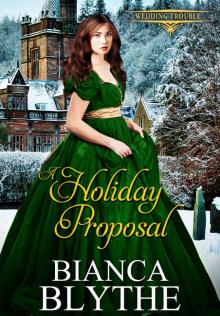 A Holiday Proposal (Wedding Trouble Book 6)
A Holiday Proposal (Wedding Trouble Book 6) The Earl's Christmas Consultant (Wedding Trouble Book 3)
The Earl's Christmas Consultant (Wedding Trouble Book 3) A Kiss for the Marquess (Wedding Trouble Book 5)
A Kiss for the Marquess (Wedding Trouble Book 5)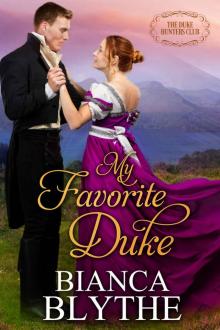 My Favorite Duke (The Duke Hunters Club Book 2)
My Favorite Duke (The Duke Hunters Club Book 2)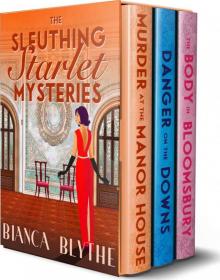 The Sleuthing Starlet Mysteries
The Sleuthing Starlet Mysteries Lords, Snow and Mistletoe
Lords, Snow and Mistletoe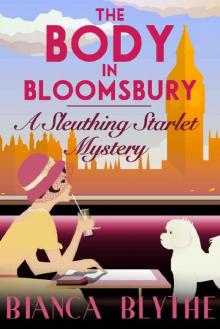 The Body in Bloomsbury
The Body in Bloomsbury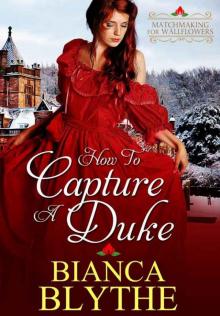 How to Capture a Duke (Matchmaking for Wallflowers Book 1)
How to Capture a Duke (Matchmaking for Wallflowers Book 1)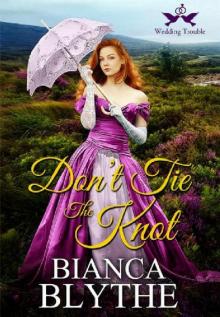 Don't Tie the Knot
Don't Tie the Knot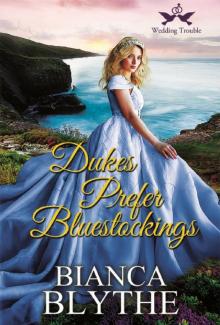 Dukes Prefer Bluestockings
Dukes Prefer Bluestockings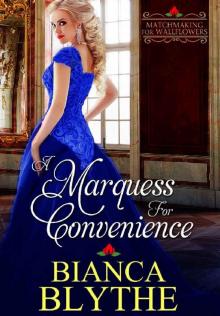 A Marquess for Convenience (Matchmaking for Wallflowers Book 5)
A Marquess for Convenience (Matchmaking for Wallflowers Book 5) Lords, Snow and Mistletoe: A Regency Christmas Collection
Lords, Snow and Mistletoe: A Regency Christmas Collection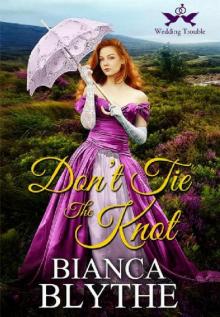 Don't Tie the Knot (Wedding Trouble Book 1)
Don't Tie the Knot (Wedding Trouble Book 1)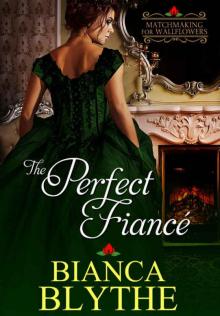 The Perfect Fiancé (Matchmaking for Wallflowers Book 0)
The Perfect Fiancé (Matchmaking for Wallflowers Book 0)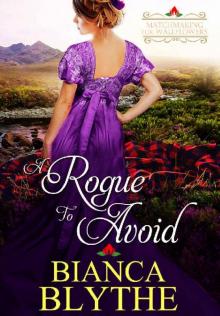 A Rogue to Avoid (Matchmaking for Wallflowers Book 2)
A Rogue to Avoid (Matchmaking for Wallflowers Book 2)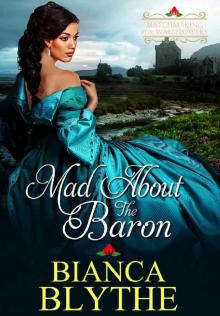 Mad About The Baron (Matchmaking for Wallflowers Book 4)
Mad About The Baron (Matchmaking for Wallflowers Book 4)